Spirulina is considered a “superfood” due to its many reported health benefits, derived from its high levels of nutrient content.
It has been described as a potent source of protein, antioxidants, and vitamins, including Vitamin A and Vitamin E.
While spirulina is increasingly gaining popularity throughout the western world, some may find it difficult to get their hands on this blue-green algae supplement due to availability or other reasons.
If you are unable to obtain genuine spirulina for your dietary needs or health remedies, there are plenty of alternatives that may offer some similar nutritive effects.
Here we have outlined five of the best options available for those seeking substitutes for spirulina.
What is Spirulina?

Spirulina is a type of blue-green algae that grows in warm, freshwater with a high salt content like that of Lake Texcoco, Mexico and the Rift Valley in Africa.
It is a high-nutrient superfood made up of essential vitamins, minerals, proteins, and much more.
What makes Spirulina so beneficial for our bodies is its rich composition of nutrients alongside being a powerful anti-inflammatory food.
Various studies have suggested it can help with fatigue, stress or even reduce age-related cognitive decline.
Additionally, this fascinating food source has also been found to reduce hunger and fat storage as well as promote weight loss.
Thus making Spirulina one of the healthiest yet underrated superfoods out there.
How to Use Spirulina?
Spirulina is a type of blue-green algae that can be used as a nutrient-rich superfood and dietary supplement.
It is rich in proteins, vitamins, minerals, antioxidants and other essential nutrients that can help improve overall health and well-being.
Spirulina can be added to smoothies, salads, soups, juices and other dishes for a nutritional boost.
Spirulina has been found to be beneficial in boosting immune system functioning, improving cardiovascular health and reducing inflammation.
It has also been shown to increase energy levels and support the body’s detoxification processes.
As with any supplement or food source, however, it’s important to consult your doctor first before adding spirulina to your diet.
5 BEST Spirulina Substitutes You Should Consider
If you’re looking for an alternative to spirulina that can provide many of the same nutritional benefits, you have plenty of options.
Here are five of the best spirulina substitutes worth considering:
1 – Chlorella
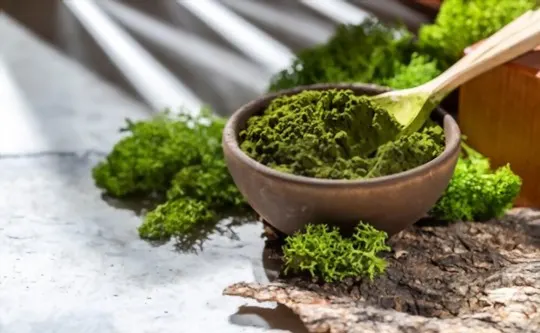
Chlorella is a microalga that is similar to Spirulina and has been widely regarded for its nutrient density.
It contains high levels of protein, antioxidants, vitamins D and B12, iron and other essential minerals.
Like Spirulina, Chlorella is a rich source of chlorophyll and supports the body in detoxifying itself from heavy metal toxins and other environmental pollutants.
Unlike Spirulina, Chlorella typically comes in a tablet or powdered form and does not have the same distinct taste, making it ideal for those with sensitive palates.
Additionally, it differs in its preparation time as it requires soaking prior to consumption but offers easier digestibility compared to spiralized versions of Spirulina.
2 – Moringa
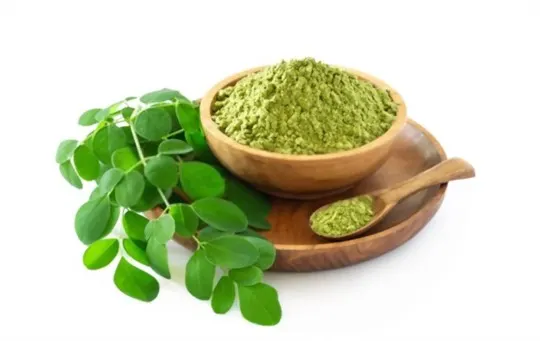
Moringa is another superfood and great substitute for Spirulina.
It is easy to find and has the following nutritional benefits:
- High in protein and amino acids (building blocks for muscle growth).
- Source of essential vitamins like Vitamin A, B1, B2, B6, and E.
- Rich source of minerals like Calcium and Iron.
- Contains powerful antioxidants that help reduce inflammation.
- Supports detoxification in the body by helping rid waste materials from cells.
Moringa can come in a variety of forms including teas, dried leaf powder, liquid extracts, pills or capsules.
It can also be added to smoothies or baked goods like breads or muffins.
Many health food stores sell Moringa supplements as well as offer recipes utilizing this superfood ingredient.
3 – Barley Grass Powder
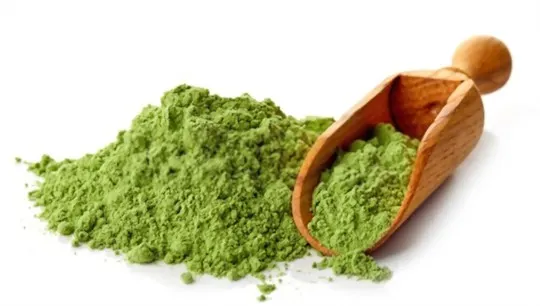
Barley Grass Powder is powdered barley grass, a type of wild green cereal grass packed with essential vitamins, minerals, and antioxidants.
It carries many of the same nutrients as spirulina and contains more beta-carotene than carrots.
Additionally, barley grass powder acting as a detoxification agent can also reduce inflammation.
Barley grass powder aids digestion by boosting the friendly bacteria in your gut, absorbing toxins and eliminating them from the body—much like spirulina does.
Studies show that it can help to treat ulcers caused by infection or inflammation.
Additionally, barley grass powder is high in dietary fiber and helps to keep you feeling full for a longer period of time.
When it comes to health benefits, barley grass powder helps to protect against diabetes by switching off genes linked to diabetes-related complications.
It also supports cardiovascular health and immune system health as well as providing antiviral protection against certain diseases such as influenza.
And for those looking for an energy boost with anti-aging benefits, it’s been found to improve cognitive function due to its antioxidant content while also helping to reduce wrinkles and fight free radicals that cause aging related damage.
4 – Wheatgrass
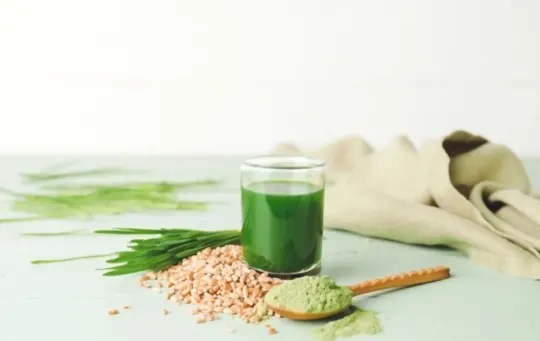
Wheatgrass is a grass species and is a colorful green extract from the tightly packed young leaf shoots of the common wheat plant.
Wheatgrass and spirulina have many similarities as superfoods; both are nutritious, detoxifying, and rich in essential amino acids, vitamins, minerals and antioxidants.
In addition to containing many of the same nutrients as spirulina, wheatgrass also provides rich sources of calcium, phosphorus, magnesium, vitamins A and E.
While it’s not a true substitute for spirulina, it can be combined with other superfoods to get some of its beneficial effects.
One note to consider: eating wheatgrass can lead to bloating or indigestion due to its high fiber content.
Make sure to start small with your intake if attempting to add this superfood into your diet.
5 – Hemp Seeds
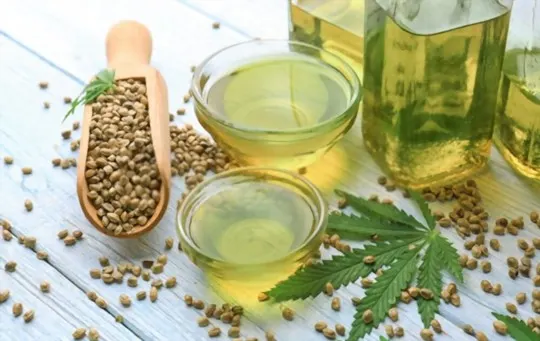
Hemp Seeds, or hemp hearts, are small, creamy and nutty seeds that come from the Cannabis sativa L.
plant.
They contain a wealth of nutrition and are considered one of the most digestible sources of protein in the world.
Hemp seeds are rich in heart-healthy omega-3 fatty acids, fiber and minerals such as iron, manganese, magnesium, phosphorus and zinc to name just a few.
Moreover hemp seed oil has anti-inflammatory properties that make it beneficial for skin conditions like eczema and psoriasis.
Hemp seeds can be added to smoothies or salads to boost texture and nutrition.
Alternatively they can be roasted in your oven for up to five minutes and sprinkled over breakfast cereals or used as an alternative to butter when baking muffins or cakes.
Conclusion
When it comes to finding the best substitute for spirulina, it’s important to consider what you’re looking to achieve with the food.
Spirulina is often used as a side to balance an individual’s overall diet by providing them with essential vitamins and minerals.
Each of the five options discussed above provides its own unique benefits, making them all beneficial choices as an alternative source of nutrition.
Having a variety of nutritional sources can be beneficial, allowing individuals to find the best combination of vitamins and minerals their body needs.
It is important to speak with your health care provider when embarking on a new dietary plan or regime.
Be sure to ask questions and discuss any doubts you may have before incorporating several supplements into your regimen so that you can make an informed decision based on your specific needs and health goals.
Frequently Asked Questions
Q: What is Spirulina?
A: Spirulina is a type of cyanobacteria, which is a type of microalgae that can be consumed by humans.
It is a source of many nutrients, including protein, vitamins, minerals, and carotenoids.
Q: What are the 5 BEST Substitutes for Spirulina?
A: The 5 BEST substitutes for Spirulina are: Chlorella, Hemp Seed Powder, Kale, Alfalfa, and Barley Grass.
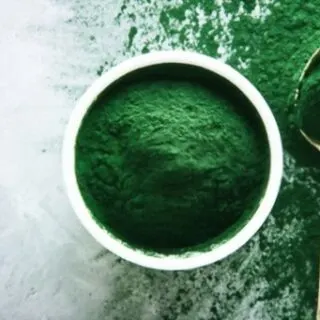
5 BEST Spirulina Substitutes You Should Consider
Ingredients
- 1 – Chlorella
- 2 – Moringa
- 3 – Barley Grass Powder
- 4 – Wheatgrass
- 5 – Hemp Seeds
Instructions
- Choose your preferred substitute from the list of options.
- Organize all of your ingredients.
- Use the proper substitute to cook your recipes.

Carrie is a food writer and editor with more than 15 years of experience. She has worked for some of the biggest names in the food industry, including Bon Appétit, Food & Wine, and Martha Stewart Living.
As the Editor in Chief of IntroChicago.com, Carrie oversees all of the content on the site. She also manages the team of contributing writers and editors, who help to create delicious recipes, helpful tips, and informative articles that you’ll find on the site.
A native of the Chicago area, Carrie is passionate about all things food. She loves trying new restaurants and experimenting with new recipes in her kitchen. She’s also a graduate of the Culinary Institute of America, so she knows a thing or two about food!
